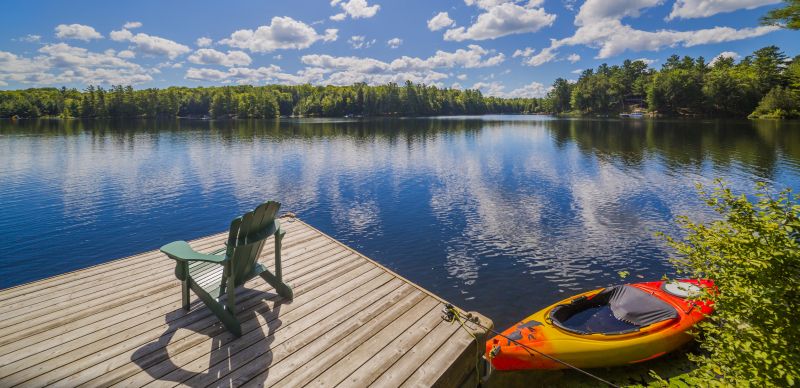Top Products For Wood Dock Installations To Enhance Durability
Discover essential tools and materials designed to ensure your wood dock is secure, long-lasting, and easy to install.
 Constructing or maintaining a wood dock requires careful selection of the right products to ensure durability, stability, and safety. The process often involves various materials and hardware designed to withstand exposure to water and weather elements. From foundational supports to surface fasteners, each component plays a vital role in creating a reliable and long-lasting structure. Proper planning and choosing quality products can help prevent common issues such as warping, rot, or loosening over time.
Constructing or maintaining a wood dock requires careful selection of the right products to ensure durability, stability, and safety. The process often involves various materials and hardware designed to withstand exposure to water and weather elements. From foundational supports to surface fasteners, each component plays a vital role in creating a reliable and long-lasting structure. Proper planning and choosing quality products can help prevent common issues such as warping, rot, or loosening over time.
Top Overall Option
Heavy-Duty Marine Fastening System
A versatile and robust fastening system designed specifically for marine environments, offering corrosion resistance and high strength. Ideal for securing beams, planks, and supports in wood dock construction, this system ensures stability and longevity. Its durable materials and reliable performance make it a preferred choice for both DIY enthusiasts and professionals.
Types of Products For Wood Dock Installations
Galvanized Deck Screws
Corrosion-resistant screws designed for fastening wood planks in outdoor and marine environments.
Stainless Steel Bolts and Nuts
Heavy-duty fasteners that provide strong, rust-proof connections for structural components.
Pressure-Treated Lumber
Wood specially treated to resist rot, decay, and insect damage, suitable for dock framing.
Dock Brackets and Corner Supports
Metal brackets used to reinforce joints and provide additional stability at critical points.
Post Anchors and Mounts
Devices used to secure vertical supports to the dock foundation or to the waterbed.
Waterproof Sealants and Caulks
Products applied to joints and seams to prevent water infiltration and extend wood life.
Marine Grade Piles
Support piles designed to withstand constant water exposure and support dock weight.
Dock Cleats and Hardware
Functional hardware for mooring boats and securing ropes on the dock surface.
Wood Preservatives and Stains
Protective coatings that enhance appearance and provide additional resistance to environmental damage.
Lift and Support Jacks
Adjustable supports used during construction or repairs to hold parts in place.
Cable and Rope Supports
Flexible support options for securing and stabilizing dock components.
Floatation Devices
Buoyant elements that help maintain the dock’s elevation and stability.
Tie-Down Straps and Anchors
Secure the dock structure to prevent movement caused by water currents or wind.
Drainage Grates and Vents
Allow water to drain properly and prevent pooling on the dock surface.
Lighting Fixtures
Enhance visibility and safety during nighttime use.
Popular Choices
Widely used fasteners suitable for securing deck planks in outdoor environments.
Commonly used for mooring and securing ropes on docks.
A popular choice for framing due to its durability and resistance to decay.
Includes cleats, hooks, and hinges designed to withstand water exposure.
Frequently selected for sealing joints and seams to prevent water infiltration.
Commonly used to elevate and stabilize the dock structure.
Popular for reinforcing joints and providing structural support.
Essential for safety and accessibility, often made with corrosion-resistant materials.
Frequently used for securing components and providing additional stability.
Protect the dock and boats from impacts and abrasion.
Popular for enhancing visibility and safety during night use.
Commonly used to maintain buoyancy and stability of the dock.
Help in water runoff and preventing pooling on the deck surface.
Widely used for securing the dock structure during storms or high winds.
Adjustable supports for construction and maintenance tasks.
When selecting products for wood dock installations, it is important to consider the specific environment and load requirements. Different types of fasteners, brackets, and supports are designed to meet varying needs, whether for new construction or repairs. Additionally, accessories like sealants and protective coatings can extend the lifespan of the wood and hardware, maintaining the integrity of the dock.
Safety and ease of installation are also key factors. Using products that are straightforward to install can save time and reduce the risk of errors. It is advisable to select hardware that is corrosion-resistant and suitable for marine environments to ensure longevity. Properly installed products contribute to a stable and secure dock, providing a safe space for recreation and access to water bodies.
Overall, investing in quality materials tailored for wood dock installation can lead to a more durable and functional structure. While the selection process may seem complex due to the variety of available products, understanding the different types and their applications can help in making informed decisions. Whether for a small personal dock or a larger commercial structure, the right products are essential for a successful project.
Key Buying Considerations
- Material durability and resistance to water and weather exposure
- Compatibility of fasteners with the wood type used
- Corrosion resistance, especially for marine environments
- Load capacity and structural support requirements
- Ease of installation and availability of mounting hardware
- Compatibility with existing dock components or future upgrades
- Availability of protective coatings or sealants for longevity
- Environmental conditions such as wave action, wind, and water level changes
- Regulations or codes applicable to water-based structures
- Budget constraints and long-term maintenance costs
- Safety features like slip-resistant surfaces or secure mooring points
- Flexibility for modifications or expansions
- Compatibility with tools and installation methods
- Quality certifications or standards compliance
- Reputation and reviews of product durability
